初中英语冠词知识点提纲
初中英语冠词用法总结归纳

冠词一.不定冠词1.不定冠词a,anA用于以辅音因素或半元音因素/j/,/w/开头的单词。
An用于元音因素开头的单词注意:元音因素开头的单词,首字母不一定就是元音字母例如,hour,honest等单词,看起来是以辅音字母开头,但是发音时辅音字母h没有发音,而是以元音开头,因此前面应加不定冠词an。
而有些单词如university,uniform等单词,是以元音字母u开头,但是读音时u发半元音/j/开头,所以前面应加a。
2.不定冠词的用法。
(1)用于可数名词的单数前,表示数量“一”,如:I have a new pen.(2)表示一类人或物,如:An elephant is big and strong.(3)第一次提到的人或物,如:Look, a dog is running to us.(4)表示“每一”的意思,如:I go shopping once a week.3.不定冠词的固定搭配have a look 看一下 have a good time 玩得愉快take a break 休息一下 take a walk 散步in a hurry 急匆匆地 half an hour 半小时a lot of 许多,大量 a great deal of 大量 +不可数名词a number of 许多 +可数名词 a few 一些 +可数名词a little 一些 +不可数名词二.定冠词1.定冠词the的用法(1)特指某些人或物,例如:The woman in red dress is my mother.(2)特指前面提到过的人或物,例如:I have a dog. The dog is cute.(3)指谈话双方都知道的人或事物。
What do you think of the novel?(4)指宇宙间独一无二的东西,如:The moon is bright at night.(5)用于单数名词前表示一类人或物,如:The horse is a useful animal.(6)用于序数词前,如:、January is the first month of the year.(7)用于形容词的最高级前面,如:John is the tallest student in my class.(8)用于方位和位置前,如:At the top of at the back of at the bottom of at the middle of(9)用于某些专有名词前,如:the Yangtze River the Great Wallthe United Nations the Summer Palace(10)用于姓氏复数前,表示一家人,如:The Wangs are having dinner now。
初中英语冠词的语法归纳
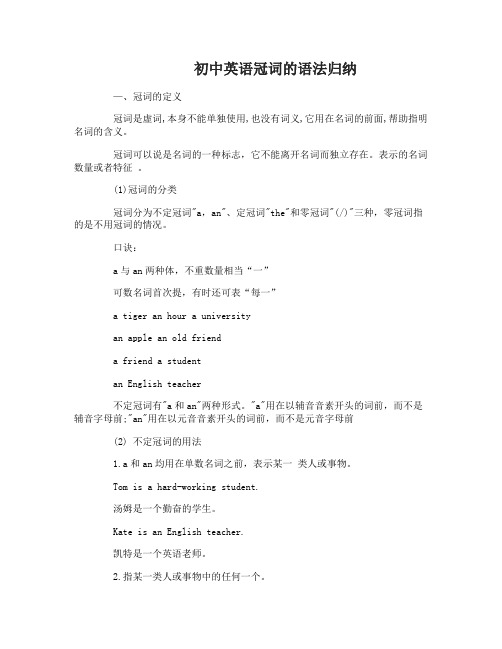
初中英语冠词的语法归纳—、冠词的定义冠词是虚词,本身不能单独使用,也没有词义,它用在名词的前面,帮助指明名词的含义。
冠词可以说是名词的一种标志,它不能离开名词而独立存在。
表示的名词数量或者特征。
(1)冠词的分类冠词分为不定冠词"a,an"、定冠词"the"和零冠词"(/)"三种,零冠词指的是不用冠词的情况。
口诀:a与an两种体,不重数量相当“一”可数名词首次提,有时还可表“每一”a tiger an hour a universityan apple an old frienda friend a studentan English teacher不定冠词有"a和an"两种形式。
"a"用在以辅音音素开头的词前,而不是辅音字母前;"an"用在以元音音素开头的词前,而不是元音字母前(2) 不定冠词的用法1.a和an均用在单数名词之前,表示某一类人或事物。
Tom is a hard-working student.汤姆是一个勤奋的学生。
Kate is an English teacher.凯特是一个英语老师。
2.指某一类人或事物中的任何一个。
A steel worker makes steel.钢铁工人炼铁。
Pass me an apple,please.请递给我一个苹果。
3.泛指某人或某物,但不具体说明何人或何物。
A student wants to see you.有个学生想见你。
A girl is waiting for you outside.有个女孩正在外面等你。
4.表示“每一”的意思,相当于every。
Take the medicine three times a day.这种药每天吃三次。
They go to see their grandparents once a week. 他们每周去看一次他们的祖父母。
初中英语冠词知识点总结讲解
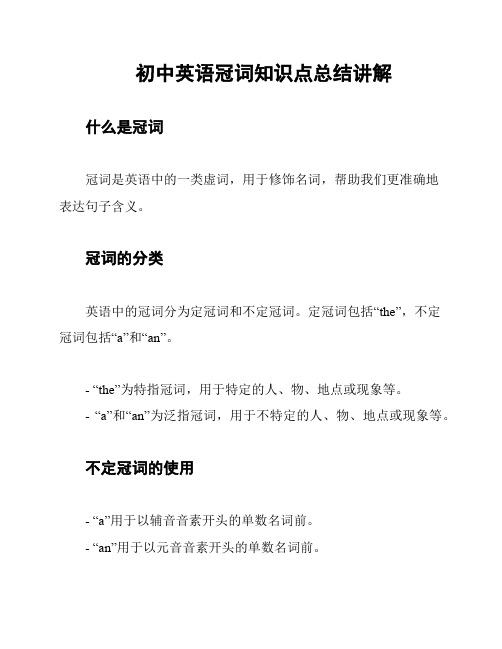
初中英语冠词知识点总结讲解什么是冠词
冠词是英语中的一类虚词,用于修饰名词,帮助我们更准确地
表达句子含义。
冠词的分类
英语中的冠词分为定冠词和不定冠词。
定冠词包括“the”,不定
冠词包括“a”和“an”。
- “the”为特指冠词,用于特定的人、物、地点或现象等。
- “a”和“an”为泛指冠词,用于不特定的人、物、地点或现象等。
不定冠词的使用
- “a”用于以辅音音素开头的单数名词前。
- “an”用于以元音音素开头的单数名词前。
例句:
- I have a book.(我有一本书。
)
- She is an honest girl.(她是一个诚实的女孩。
)
定冠词的使用
定冠词“the”用于特定的人、物、地点或现象等,包括以下情况:
1. 对唯一的东西进行特指。
2. 对某个已知的事物进行指代。
3. 用于特定事物的第二次提及。
例句:
- The sun rises in the east.(太阳从东方升起。
)
- Please pass me the salt.(请递给我那个盐瓶。
)
- I like the cake you made yesterday.(我喜欢你昨天做的蛋糕。
)小结
在研究初中英语的过程中,了解和熟记冠词的用法非常重要。
记得注意单词首字母的发音,选择使用“a”还是“an”才能更准确地表达句子意思。
同时,如果想要特别强调某个人或事物,就要使用定冠词“the”。
希望本文所述内容对您有所帮助,谢谢阅读!。
初中英语知识点归纳定冠词和不定冠词的使用总结
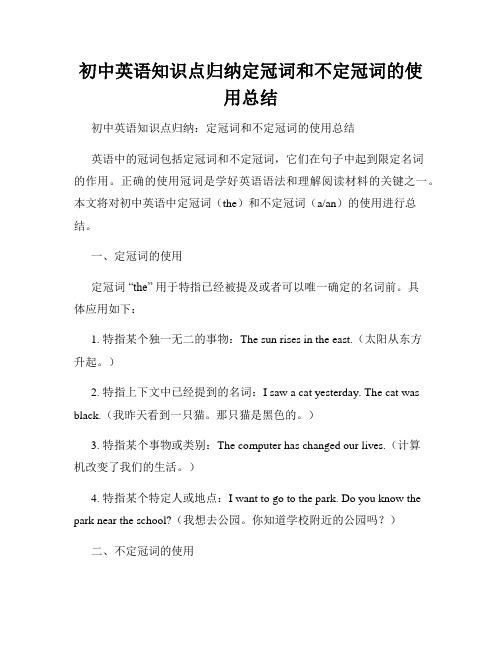
初中英语知识点归纳定冠词和不定冠词的使用总结初中英语知识点归纳:定冠词和不定冠词的使用总结英语中的冠词包括定冠词和不定冠词,它们在句子中起到限定名词的作用。
正确的使用冠词是学好英语语法和理解阅读材料的关键之一。
本文将对初中英语中定冠词(the)和不定冠词(a/an)的使用进行总结。
一、定冠词的使用定冠词“the” 用于特指已经被提及或者可以唯一确定的名词前。
具体应用如下:1. 特指某个独一无二的事物:The sun rises in the east.(太阳从东方升起。
)2. 特指上下文中已经提到的名词:I saw a cat yesterday. The cat was black.(我昨天看到一只猫。
那只猫是黑色的。
)3. 特指某个事物或类别:The computer has changed our lives.(计算机改变了我们的生活。
)4. 特指某个特定人或地点:I want to go to the park. Do you know the park near the school?(我想去公园。
你知道学校附近的公园吗?)二、不定冠词的使用不定冠词“a/an” 用于泛指名词,表示数量不确定或未提及过的事物。
具体应用如下:1. 用于表示某一个不确定的泛指事物:I saw a bird in the sky.(我在天上看到一只鸟。
)2. 用于表示某个职业或身份:She wants to be a teacher.(她想成为一名教师。
)3. 用于表示一种事物或一类人:A dog is a loyal animal.(狗是一种忠诚的动物。
)4. 不定数量的表示:She eats an apple every day.(她每天吃一个苹果。
)三、定冠词和不定冠词的特殊用法在一些特殊情况下,定冠词和不定冠词的用法有一些特殊规则需要注意。
1. 用于序数词和形容词最高级前:He came in the first place.(他在第一名。
初中英语知识点归纳定冠词和不定冠词的使用
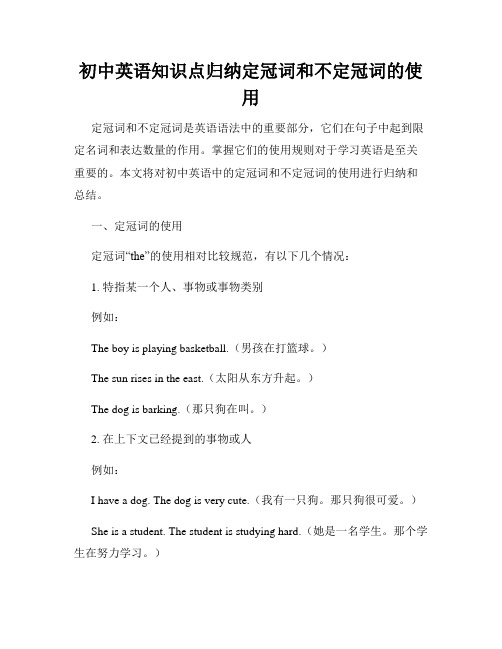
初中英语知识点归纳定冠词和不定冠词的使用定冠词和不定冠词是英语语法中的重要部分,它们在句子中起到限定名词和表达数量的作用。
掌握它们的使用规则对于学习英语是至关重要的。
本文将对初中英语中的定冠词和不定冠词的使用进行归纳和总结。
一、定冠词的使用定冠词“the”的使用相对比较规范,有以下几个情况:1. 特指某一个人、事物或事物类别例如:The boy is playing basketball.(男孩在打篮球。
)The sun rises in the east.(太阳从东方升起。
)The dog is barking.(那只狗在叫。
)2. 在上下文已经提到的事物或人例如:I have a dog. The dog is very cute.(我有一只狗。
那只狗很可爱。
)She is a student. The student is studying hard.(她是一名学生。
那个学生在努力学习。
)3. 表示上下文中的唯一事物或人例如:The sun is shining.(太阳在照耀。
)The moon is beautiful tonight.(今晚的月亮很美。
)4. 表示普遍概念例如:The tiger is a wild animal.(老虎是一种野生动物。
)The sky is blue.(天空是蓝色的。
)二、不定冠词的使用不定冠词“a”和“an”的使用有以下几个情况:1. 泛指某一类人或事物,表示不具体数量例如:I want to buy a book.(我想买一本书。
)He has a car.(他有一辆车。
)2. 表示首次提及的人或事物例如:I saw an elephant in the zoo.(我在动物园里看到了一头大象。
)She is an engineer.(她是一名工程师。
)3. 以元音音素开头的单词前使用“an”,其他情况下使用“a”例如:I need an apple.(我需要一个苹果。
初中英语冠词知识点
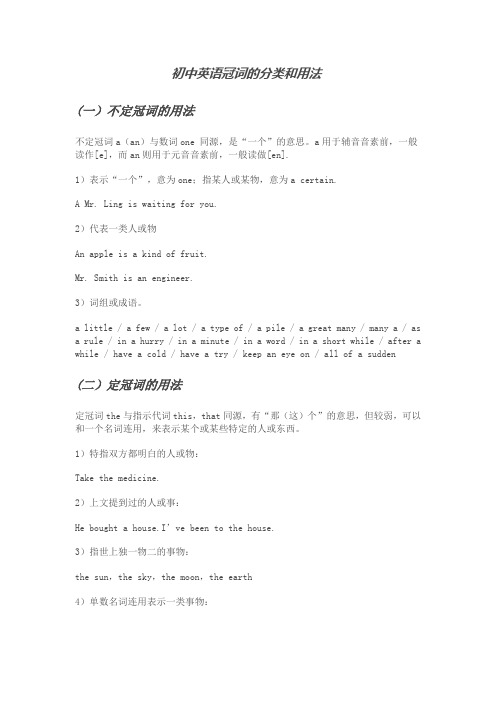
初中英语冠词的分类和用法(一)不定冠词的用法不定冠词a(an)与数词one 同源,是“一个”的意思。
a用于辅音音素前,一般读作[e],而an则用于元音音素前,一般读做[en].1)表示“一个”,意为one;指某人或某物,意为a certain.A Mr. Ling is waiting for you.2)代表一类人或物An apple is a kind of fruit.Mr. Smith is an engineer.3)词组或成语。
a little / a few / a lot / a type of / a pile / a great many / many a / as a rule / in a hurry / in a minute / in a word / in a short while / after a while / have a cold / have a try / keep an eye on / all of a sudden(二)定冠词的用法定冠词the与指示代词this,that同源,有“那(这)个”的意思,但较弱,可以和一个名词连用,来表示某个或某些特定的人或东西。
1)特指双方都明白的人或物:Take the medicine.2)上文提到过的人或事:He bought a house.I’ve been to the house.3)指世上独一物二的事物:the sun,the sky,the moon,the earth4)单数名词连用表示一类事物:如:the dollar 美元;the fox 狐狸;或与形容词或分词连用,表示一类人:the rich 富人;the living 生者。
5)用在序数词和形容词最高级,及形容词only,very,same等前面:Where do you live?I live on the second floor.That’s the very thing I’ve been looking for.6)与复数名词连用,指整个群体:They are the teachers of this school.指全体教师)They are teachers of this school. (指部分教师)7)表示所有,相当于物主代词,用在表示身体部位的名词前:She caught me by the arm……8)用在某些由普通名词构成的国家名称、机关团体、阶级、等专有名词前:the People’s Republic of Chinathe United States9)用在表示乐器的名词之前:She plays the piano.10)用在姓氏的复数名词之前,表示一家人:the Greens 格林一家人(或格林夫妇)11)用在惯用语中:in the day,in the morning (afternoon,evening),the day after tomorrowthe day before yesterday,the next morning,in the sky (water,field,country)in the dark,in the rain,in the distance,in the middle (of),in the end,on the whole,by the way,go to the theater(三)零冠词的用法1)国名,人名前通常不用定冠词:England,Mary;2)泛指的复数名词,表示一类人或事物时,可不用定冠词;They are teachers.3)抽象名词表示一般概念时,通常不加冠词;Failure is the mother of success.4)物质名词表示一般概念时,通常不加冠词,当表示特定的意思时,需要加定冠词;Man cannot live without water.5)在季节、月份、节日、假日、日期、星期等表示时间的名词之前,不加冠词;We go to school from Monday to Friday.6)在称呼或表示官衔,职位的名词前不加冠词;The guards took the American to General Lee.7)在三餐、球类运动和娱乐运动的名称前,不加冠词;如:have breakfast,play chess8)当两个或两个以上名词并用时,常省去冠词;I can’t write without pen or pencil.9)当by 与火车等交通工具连用,表示一种方式时,中间无冠词;by bus,by train;10)有些个体名词不用冠词;如:school,college,prison,market,hospital,bed,table,class,town,church,court 等个体名词,直接置于介词后,表示该名词的深层含义;go to hospitalgo to the hospital11)不用冠词的序数词;a. 序数词前有物主代词b. 序数词作副词:He came first in the race.c. 在固定词组中:at (the)first,first of all,from first to last冠词练习1( ) 1. There is ________ “M” and ________ “Y” in the word “my”.A. an, aB. a, anC. an, an( ) 2. ________ English is ________ difficult subject for most of ________ students.A. /, a, theB. The, a, theC. The, the, the( ) 3. I’m going to learn ________ second la nguage in _________ second grade.A. a, aB. the, /C. a, the( ) 4. My sister was ill in ________ bed, and my mother was sitting on ________ bed by her.A. /, theB. /, /C. the, the( ) 5. We have _____ lunch at school on weekdays and we enjoy ______ lunch very much.A. /, theB. /, /C. a, /( ) 6. We can’t see ________ sun at ________ night. But we can see the moon and the stars.A. the, theB. the, /C. a, /( ) 7. My brother likes playing ________ football very much, but he doesn’t like ________ football I bought him for his birthday.A. the, theB. /, theC. the, /( ) 8. ________ teacher and ________ writer is still in our school.A. The, theB. A, aC. The, /( ) 9. Jim was made ________ of Class Three.A. monitorB. a monitorC. the monitor( ) 10. From then on ________ began looking for ways to go into ________.A. man, spaceB. the man, spaceC. man, the space( ) 11. More college graduates would like to work in ________ west part of our country ________ next year.A. the, theB. /, /C. the, /( ) 12. There is ________ old man standing there. ________ old man looks worried.A. an, AnB. an, TheC. the, The( ) 13. The football players from ________ USA live in _________ Room Nine.A. the, /B. /, theC. an, /( ) 14. We’re invited to have ________ supper with ________ Whites tomorrow.A. the, theB. /, theC. the, /( ) 15. Last year my cousin Mary was ________ university student of ________ physics.A. a, theB.an, theC. a, /( ) 16. There are many poor people in ________ world. I think _________ rich must help________ poor.A. the, the, theB. the, a, aC. /, the, the( ) 17. Tom, do you know ________ girl in ________ blue?A. the, theB. the, /C. a, /( ) 18. Lesson One is ________ very difficult lesson, but it is not ________ most difficult one in Book One.A. a, theB. the, theC. a, a( ) 19. --- Is Canada ________ English-speaking country?--- Yes. And Canadians speak ________ French, too.A. a, /B. an, /C. a, the( ) 20. ________ Yellow River is ________ second longest river in China.A. The, /B. /, theC. The, the冠词练习2( ) 1. There isn’t ________ river near where I live. ________ nearest river is 500kilometers away.A. a, TheB. an, AC. the, A( ) 2. ________ old lady with white hair spoke ________ English well at ________ meeting.A. An, an, aB. The, /, anC. The, /, the( ) 3. --- Will you get there by ________ train? ---- No, I’ll take ________ taxi.A. /, aB. a, theC. /, /( ) 4. --- Is ________ English-Chinese dictionary on the desk yours?--- No, I don’t have ________ English-Chines dictionary.A. /, aB. a, theC. the, an( ) 5. ---- My brother is playing _____ basketball while my sister is playing ______ piano.A. /, /B. the, theC. /, the( ) 6. My grandparents often stay at ________ home at ________ weekends.A. /, theB. /, /C. the, the( ) 7. --- What would you like for ________ breakfast, Mr. Fang?--- Three pieces of bread with ________ cup of black tea, please.A. a, aB. /, theC. /, a( ) 8. This is ________ interesting story and it is also ________ moving one.A. an, anB. an, theC. an, a( ) 9. Some people are still in ________ habit of writing in ________ public places.A. the, theB. /, /C. the, /( ) 10. Young men prefer going by ________ plane to going in ________ ship.A./, aB. the, aC. /, the( ) 11. ________ long the bridge is! Let me drive you over it.A. WhatB. What aC. How( ) 12. People like to see films on ________ TV instead of going to ________ cinema.A. the, theB. /, theC. the, /( ) 13. ______ Smiths are going to the park this Sunday. Why don’t we go for ______ walk?A. A, aB. An, /C. The, a( ) 14. ________ China is ________ old country with ________ long history.A. The, an, aB. /, an, aC. /, an, the( ) 15. I will have ________ supper with ________ Blacks in the restaurant this weekend.A. the, theB. the, /C. /, the( ) 16. There’s going to be ________ interesting American film on________ night of August 4th.A. an, theB. an, aC. a, the( ) 17. ________ little girl making faces is ________ Australian.A. The, anB. A, anC. A, /初中英语冠词的用法练习题( ) 1. Han Meimei is ___ Chinese girl. Lucy is ____ English girl.A. a; aB. an; anC. a; anD. an; a( )2.A little boy wrote____ "U" and___ "n" on the wall.A. a; anB. an; aC. an; anD. a; a( ) 3 _____ old lady in brown is____ university professor.A. An; aB. An; /C. The; anD. The; a( ) 4 There are sixty minutes in____ hour.A. anB. theC. aD. /( ) 5 This is ____ interesting book and it is also ____ useful one.A. an; anB. an; theC. ah; aD. a; a( ) 6 A computer is useful tool in 'o world today.A. an; theB. a; theC. the; theD. a; a( ) 7. We have never seen ____ interesting film.A. suchB. such anC. soD. such a( ) 8. Mrs. Smith is ____ friend of __A. the; mineB. a; meC. the; myD. a; mine( ) 9. He is ___ boy.A. a seven-years-oldB. an eight-year-oldC. the seven-year-oldD. an eight-year-older( ) 10. Father saw____ accident in the street yesterday.A. theB. aC. anD. /( ) 11.Now he is ___ artist. 1 have known him since he was ___ one-year-old boy.A. a; anB. a; aC. an; anD. an; a( ) 12. Which bigger ___ elephant or ___ horse?A. a; theB. an; aC. the; anD. an; the( ) 13. ____monkey can climb____ trees .A. /; theB. A; /C. The; aD. /; /( ) 14. ____ rains are faster than ____ buses.A. /; /B. The; /C. /; theD. The; a( ) 15. -Have you learned German? -Yes. It's ___ language I've ever learned.A. a quite difficult B: quite a difficult C. difficult quite D. difficult a quite( ) 16. Some animals, like ____ cat, ____ dog or ____ wolf, do not need to hibernate (冬眠).A. /; /; theB. the; the; theC. a; /; the ,D. the; /; / ( ) 17. Yesterday we held____ talk with them in the hall.A. theB. thisC. aD. an( ) 18.My mother had___ fever, so I had to look after her.A a B. the C, / D. this( ) 19. Looking at, he took___ deep breath.A. /B. aC. thatD. its( ) 20. I usually go out for ___ walk after____ tea;A: a; / B. /; the C. a; a D. the; a( ) 21.After that they had ____ sleep.A. a night goodB. a night's goodC. a good nightD. a good night's ( ) 22. It is____ since we ____last time.A. long time; metB. a long time; meetC. a long time; metD. the long time; meet( ) 2 3.There came ____ great noise. It frightened us.A. theB. aC. /D. that( ) 24.It is____ pleasure to work with these workers.A. anB. /C. aD. this( ) 25. After ____ quick breakfast I hurried to ____ school.A. /; /B. a; /C. the; theD. the; /( ) 26.This is____ egg . ____egg is big。
初中英语知识点归纳常见的冠词和冠词短语

初中英语知识点归纳常见的冠词和冠词短语冠词是英语中的一类词语,用于限定名词的范围或特性。
在学习英语的过程中,掌握冠词的正确用法是非常重要的。
本文将对常见的冠词和冠词短语进行归纳和总结,以帮助初中学生更好地理解和运用。
一、定冠词定冠词"the"是英语中使用最频繁的冠词之一。
它常常用于特指某个人或物,以及已经提到的人或物。
1. 特指某个人或物:- The book on the table is mine.(桌子上的那本书是我的。
)- The boy standing there is my brother.(站在那边的男孩是我弟弟。
)2. 已经提到的人或物:- I have a cat. The cat is very cute.(我有一只猫。
那只猫非常可爱。
)二、不定冠词不定冠词有两个形式:“a”和“an”,用于泛指或表示数量的未知。
1. a的用法:- I saw a dog in the park.(我在公园看见了一只狗。
)- There is a book on the shelf.(书架上有一本书。
)2. an的用法:- There is an apple on the table.(桌子上有一个苹果。
)- She is an English teacher.(她是一名英语教师。
)三、零冠词零冠词即指名词前无冠词的情况,常出现在一些特殊的语境中。
1. 专有名词:- Peter is a student.(彼得是个学生。
)- London is a beautiful city.(伦敦是个美丽的城市。
)2. 表示广义概念:- Water is essential for life.(水对生命很重要。
)- Sugar is bad for your health.(糖对健康不好。
)四、冠词短语除了单个的冠词外,还有一些常用的冠词短语需要掌握。
1. all the:- I have read all the books on the shelf.(我已经读过书架上的所有书了。
初中英语名词冠词使用知识点归纳总结

初中英语名词冠词使用知识点归纳总结第一课时名词一、概述1、名词的属性:表示人或事物的名称抽象概念的词叫名词。
2、名词分普通名词和专有名词。
普通名词是表示某一类人或事物,或某种物体或抽象概念的名称。
如:teacher, desks, plates, milk, box等,专有名词表示某一特定的人、事物、地方团体、党派、国家机关、语言、节日等专用的名称。
(运用)如:China, Chinese, Saturday, June, Green, Beijing, Olympic等。
(专有名词的第一个字母要大写)二、可数名词与不可数名词1、可数名词是指表示人或事物,可以用数来计量的名词,有单复数之分。
如:glass-----glasses; book---- books2、不可数名词是指所表示的事物不能用数来计量。
如:paper, rice, water , milk, tea等。
3、有些名词在特定情况下由不可数变为可数名词。
Light travels faster than sound; (light:光线,不可数)The lights are on.(light:灯,可数)4、不可数名词的量的表示不可数名词一般无法用数来计算,前面不能用a或an或数词来表示数量,它的量往往借助于容器来表示。
如:a glass of milk ------four glasses of milka piece of paper------two pieces of papera bag of rice------three bags of rice三、可数名词的复数形式(识记、运用)1、可数名词在应用时有单复数之分,单数变复数有规则变化和不规则变化两种。
规则变化policeman---policemen; man---men; woman---women;tooth---teeth; foot---feet; sheep---sheep; deer---deer;Japanese--- Japanese; Chinese --- Chinese; fish --- fish四、名词所有格(运用)名词的所有格是表示所有关系的形式,它也有构成上的变化。
- 1、下载文档前请自行甄别文档内容的完整性,平台不提供额外的编辑、内容补充、找答案等附加服务。
- 2、"仅部分预览"的文档,不可在线预览部分如存在完整性等问题,可反馈申请退款(可完整预览的文档不适用该条件!)。
- 3、如文档侵犯您的权益,请联系客服反馈,我们会尽快为您处理(人工客服工作时间:9:00-18:30)。
专题二:冠词
冠词三兄弟:a,an,the
1. 不定冠词的基本用法:
(1)不定冠词有a和an两种:a用于辅音音素开头的词前,例如:a dog,an用于元音音素开头的词前,例如:an apple;
(2)表示the same,a certain或every的意思
They are of an age.=the same
(3)用来表示“一”的意思(one),但不强调数的观念,只说明名词为不特定者。
即不具体说明是何人何物。
例如:She picked up a book and began to read.
I will return in a day or two.=one
(4)一般用在可数名词单数前,指人或事物的某一种类。
例如:I am a nurse.
(5)用在某些固定词组中,如have a rest,a few,a lot 等。
(6)It is a most useful book.(most=very)它是一本非常有用的书
(6)有些不可数名词,如knowledge,collection,understanding等名词是由其动词转化而来的,它们后面加of短语时,前面需要用不定冠词a/an
He has a fine collection of paintings.
You need a good knowledge of English.
(7)不定冠词的特殊位置
quite/rather+a/an(+adj.)+单数名词
what/such/half+a/an+单数名词
so/as/too/how/however+adj.+a/an+单数名词
many a/an +单数名词
not a/an+单数名词
eg.He is quite a kind guy.
He is as great a man as ever lived.
How clever a student he is.
2. 定冠词的用法(the):
(1)用在姓氏复数前,表示一家人或者夫妇二人
The Greens are at the table.格林一家在吃饭。
(2)指双方都知道的人或事物,例如:Open the door,please.
(3)指上文提到的人或事物。
(4)用在世界上独一无二的事物前。
例如:The sun is bigger than the moon.太阳比月亮大些。
(5)用在序数词和形容词最高级前。
例如:The first island is the biggest of the three.第一个小岛是三个中最大的。
(6)用在形容词前表示一类人,the +形容词指的是一群人,是一种复数含义,所以其后动词应用复数形式。
例如:The old are sick.
(7)用在年代、朝代名词和逢十的数词(表示某个年代)前
the Tango Dynasty唐朝
the Spring and Autumn Peruod春秋时期
in the 1990’s在20世纪90年代
(8)动词+sb.+介词+the表示身体某一部位的名词,这种结构中the不能用人称、物主代词代替
take sb. by the arm抓住某人的胳膊
hit sb. in the face打某人的脸
(9)用在表示度量单位的名词前。
表示“按……计算”
Eggs are sold by the dozen.鸡蛋按打卖(一打12个)
(9)定冠词的特殊位置
定冠词一般放在最前面,但如果有exactly,just,half,double,twice,all,both,of等修饰时,定冠词要放在这些词的后面
exactly the same color完全相同的颜色
just the right place就是这个地方
half the story 故事的一半
3. 零冠词的用法,就是不用冠词的情况。
1)国名,人名前通常不用定冠词:England,Mary;
2)泛指的复数名词,表示一类人或事物时,可不用定冠词;不可数名词不用冠词
They are teachers. 他们是教师。
3)抽象名词表示一般概念时,通常不加冠词;
Failure is the mother of success. 失败乃成功之母。
4)物质名词表示一般概念时,通常不加冠词,当表示特定的意思时,需要加定冠词;Man cannot live without water. 人离开水就无法生存。
5)在季节、月份、节日、假日、日期、星期等表示时间的名词之前,不加冠词;
We go to school from Monday to Friday. 我们从星期一到星期五都上课。
6)在三餐、学科、惯用语、球类运动和娱乐运动的名称前,不加冠词;如:have breakfast,play chess
7)当by与火车等交通工具连用,表示一种方式时,中间无冠词;by bus,by train;
8)固定短语,如:go to hospital去医院看病;at home,in class,go to bed等。
9)系动词turn(变成)后面的单数名词作表语时,不用冠词
10)独立主格结构的某一形式中
The teacher come in,book in hand.
冠词的活用:the+序数词表示排序
a/an+序数词不表示排序,表示“又一、再一”
序数词修饰动词时,不和冠词连用
eg.Can you give me a second chance,please?(another chance)
He was only 5 years old when I first saw him.
有些短语有无冠词含义不同
go to school 去上学 go to the school到学校去(不一定是去上学)
go to church去做礼拜 go to the church去教堂
go to bed就寝 go to the bed 走到床前(不一定就是去睡觉)
go to sea 出海(是海员) go to the sea去海边(不一定是海员)
be in hospital在住院 be in the hospital在医院里(不一定是病人)
be in prison在坐牢 be in the prison 在监狱(不一定是犯人)
in front of 在……(外面)的前面 in the front of在……(内部)的前面
sit at table 坐在桌旁吃饭 sit at the table坐在桌旁(不一定是吃饭)by day在白天 by the day 按天计算
take place发生 take the place of 代替
in possession of sth. 拥有某物 in the possession of sth.为某人所拥有
in sight of看见 in the sight of 据……了解
in place of 代替 in the place of 在……的地方
in future 今后 in the future将来
in office执政 in the office 在办公室
in class上课 in the class在班级中
in store 储存 in the store 在仓库中
out of question毫无疑问的 out of the question不可能的
in charge of 负责、管理、掌控 in the charge of 由…负责/由…掌控。
